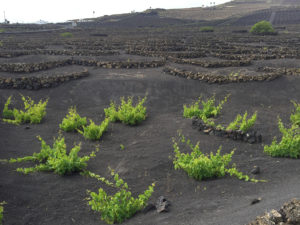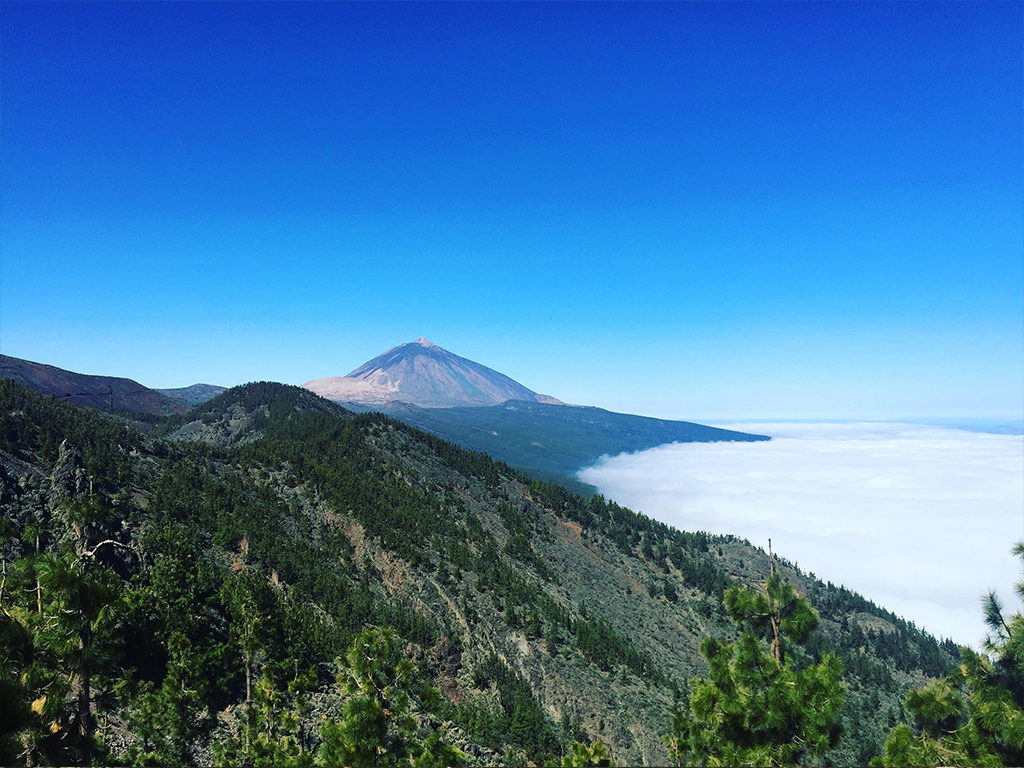Of all the places I have been lucky enough to travel for wine, there are few places that I have found as fascinating as the Canary Islands. A Spanish archipelago of volcanic origin, about 60 miles off the coast of southern Morocco, the Canaries have long been a cultural crossroads between the continents of Africa, Europe, and North and South America. Due to their volcanic soil, which prevented the reach of phylloxera, and the islands’ relative isolation in the Atlantic, the Canaries are home to unique varieties of grapes that would have otherwise been lost to history. Vinicius Rodrigues, the Iberian and South American Portfolio Manager for David Bowler Wine, says on that point, “I like to see the Canaries as a living museum of what the wines of Spain and Portugal were in the 1500’s, since many of those grapes in the islands today came from Europe, but were forgotten on the mainland long ago.”

Mt Teide, high desert, volcanic landscape

Vineyards in Lanzarote

Sea & Sky
The Canary Islands are a beautiful land, a land of volcano, desert, mountain, forest, vineyard and ocean. This range of distinct terroirs and altitudes, where a particular set of grapes that has been historically grown at each height, lends an array of microclimates that winemakers can explore and experiment with, as well as research the unique history of each grape and place.
We will pour wines from three very special growers in the Canary Islands, namely Borja Pérez Viticultor, Envínate, and Viñátigo.
On the subject of the current and historical state of viticulture in the Canary Islands, there is perhaps no greater resource than Juan Jesús Méndez Siverio of Viñátigo.
Please see below for an in-depth interview with winemaker Juan Jesús Méndez Siverio of Viñátigo in Tenerife. He discusses some of the fascinating history of the island, as well as some big insight into the unique terroirs of the Canaries.
Interview with Juan Jesús Méndez Siverio of Viñátigo

Juan Jesús of Viñátigo
What makes the wines of the Canaries unique?
There are several aspects that make the Canary Wines so unique. First of all, the lack of phylloxera in the 7 Islands is essential to understand that some of the grapes we work with are unique in the world. In total, 80 grape varieties have been identified (At Viñátigo we have collaborated with important universities to identify them during the last 25 years). As the varieties are ungrafted, there are directly in contact with the young volcanic soil, which translates into a very mineral character in the wines. Last but not least, an exceptional weather that has nothing to see with our neighborhood the Sahara desert. Thanks to the fresh Trade Winds, we have an Atlantic mild weather that makes possible making fresh and elegant wines. Of course, each Island and its gradients have their own micro-climates, so the range of different wine styles is also very wide inside the Canary Islands Region.
While certainly the world pays more attention to the wines of the Canaries than they used to (except for during the Colonial era, when the world paid big attention to the Canaries), has winemaking on the island changed much in the past 30 years?

Showing the Caribbean roots: an old Cuban rum barrel still in use for winemaking at Monje in Tenerife
Absolutely. As a consequence of the Methuen Treaty, the Canary Wine was replaced by the Madeiras and Portos in the international trade. This fact brought the decline of the viticulture in the Islands back in 1800. It wasn’t until the end of the XX century, from the 80’s on that the viticulture started to reappear. Old vineyards were recuperated, the cultural methods started to be improved and the wineries started to invest in good quality equipment. A new wave of well-trained viticulturists and winemakers joined the scenario, motivated to make the Canary Wines famous worldwide again. An important fact not to be missed: the recuperation of the minority grape varieties that were almost forgotten, such as Gual, Marmajuelo, Negramoll, amongst many others. So yes, definitely winemaking has changed a lot, for the better.
What do you find to be the essence of Gual?
It’s one of the most interesting white varieties that we preserve in the Canary Islands. Growing the Gual is very complicated, that’s why during years it was marginalized by the viticulturists. There aren’t more than 10 Hectares in the whole Archipelago. Despite how difficult it is to cultivate, Gual has an incredible potential, giving complex and well-structured yet fresh wines, with a very good acidity that is conserved during the ripening. From my point of view, the essence of Gual is its aromatic complexity, because of its natural smoky aromas (with no oak aging!) which translates into a high sense of minerality.
What does the Elaboraciones Ancestrales project mean to you? How did it begin?
Elaboraciones Ancestrales is going one step further on Viñátigo’s history since I took over my father’s small winery. When I started in the 90’s, I tried to improve the vinifications of the classic wines my ancestors were doing, working with the most common grapes: Listán Blanco and Listán Negro. Then, it was followed by the important project of recuperating the forgotten and near-extinct varieties of the Canary Islands (Gual, Marmajuelo, Vijariego Blanco, Tintilla, Baboso Negro, etcetera), analyzing them, studying them,micro-vinificating them and then bringing them into one varietal wines with our Collection Varietales. With the knowledge we acquired, we learnt how to blend them, creating the Ensamblaje Blanco and Ensamblaje Tinto. The cherry on top of this 25 years project which is Viñátigo is the Ancestrales Collection. It all came from a conversation with our friend Pedro Ballesteros (MB), when we came up with the idea of why not only recuperating grape varieties but ancient techniques that were not used anymore. So we started to investigate with the concrete and skin fermentation for the whites to make the White-Orange and to bring back the manual pipeage in a 1500 liters foudre for the red, always looking for the maximum authenticity.

‘Chavoco’ a system of vine-training that is grown from a crator, forming a sprawling canopy. Lanzarote.
We are featuring a few wines from the appellation of Ycoden Daute Isora in Tenerife, what sets this terroirapart from others in Tenerife?

Vineyards in Lanzarote
Viñátigo was the forefather of the creation of this Appellation. When the appellations were created in the island of Tenerife, we divided the island following the geographical division of the ancient aboriginals kingdoms, it was not done because of a terroir reason. Inside this appellation, vines grow from the sea level up to more than 1000 meters. As it’s a north-facing region, the Trade Winds play an important role bringing all their freshness and humidity to the different altitudes. However, youwill find different micro-climates depending on the height. At the same time, the soils from this region resulted from different volcanic eruptions, being some of them more than 10 million years yet the younger from 1908, when the last volcano erupted. There areso many changing factors that is impossible to affirm that Ycoden-Daute-Isora has an homogenous terroir, but hundreds, which makes it a very interesting region. For example, a Listán blanco grown at sea level with warmer temperatures will be extremely different to the same grape cultivated at 1000 meters, where there is a more continental and cold weather.
All our vineyards still are in this part of the island of Tenerife, and we still keep one wine in Ycoden Daute Isora for an historical attachment reason (the naturally sweet Malvasía Aromática Clásico), because as a winery we played a special role supporting the appellation during years. However, nowadays we prefer to work under the Appellation DOP Islas Canarias – Tenerife, because it defines the Canary Islands region from a unification of our differentiations: origin of the grapes, volcanic soils, Atlantic weather and history. The most important aspects of ourviticulture and terroir are common to all the Canary Wines.
Is there anything unique or special you would like to convey to our audience about the Canaries?
I strongly believe that the Canary Islands is one of the purest wine regions in the world. It’s like the adventure of a lifetime to be discovered. Thanks to the hard work we have been doing during the last years, we grow unique ungrafted grapes that existed hundreds of years ago but disappeared in the rest of the world because of phylloxera. This, together with our young volcanic soils and the Atlantic weather, make possible to bring into wine the authenticity of a land to discover.

Barrels at Monje
